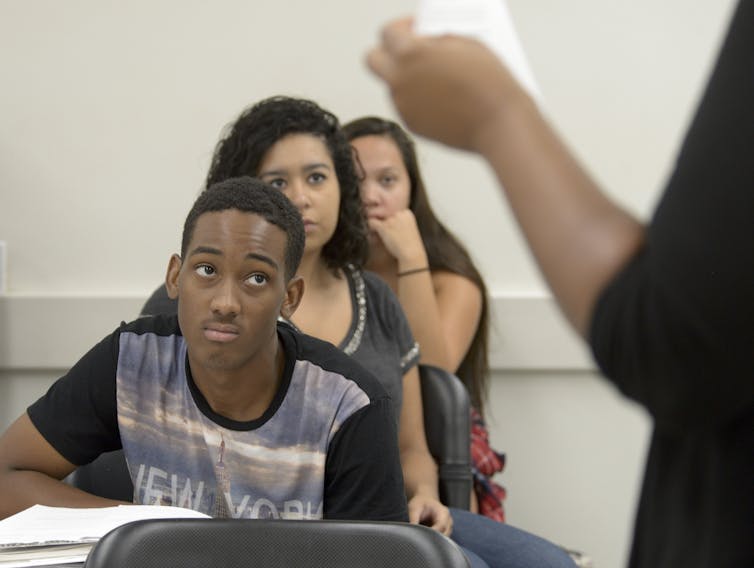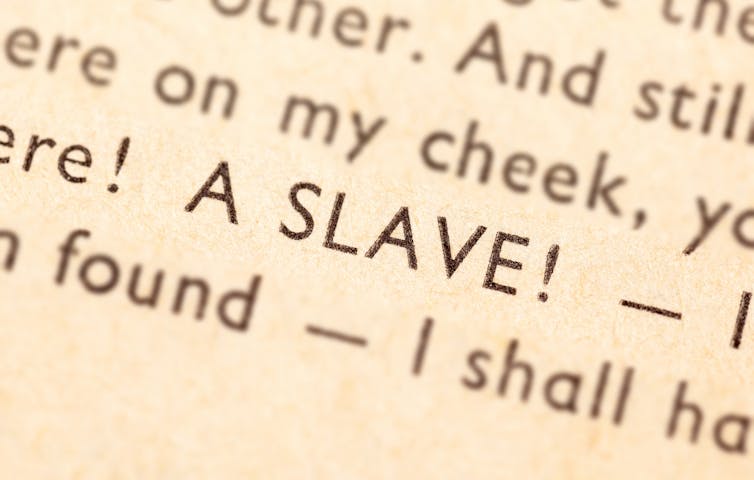Hill Avenue Studios, DigitalVision/Getty Pictures
The Trump administration’s assaults on variety, fairness and inclusion have continued within the type of a “Expensive Colleague” letter from the Division of Training to academic establishments – from preschools by way of schools and universities.
This letter calls for that colleges abandon what the Trump administration refers to as “DEI applications” and threatens to withhold federal funding if colleges don’t comply.
In accordance with President Donald Trump, these so-called DEI applications – discovered within the authorities, company and academic sectors and meant to scale back discrimination and promote the equitable remedy of individuals – are a type of antiwhite racism that damage nationwide unity and violate antidiscrimination legal guidelines.
Though the letter doesn’t have the power of regulation, it nonetheless indicators how the Trump administration plans to aggressively take authorized and monetary motion in opposition to academic establishments that refuse to conform, beginning on Feb. 28.
Consequently, the Trump administration’s menace to take away federal funding, which each private and non-private academic establishments rely closely on, is more likely to coerce compliance, at the least to some extent.
Because the letter explains, “The Division will vigorously implement the regulation on equal phrases as to all preschool, elementary, secondary, and postsecondary academic establishments, in addition to state academic companies, that obtain monetary help.”
Thus, these directives have the potential to essentially change schooling in America.
As professors of authorized research, we’ve taken an in depth have a look at the “Expensive Colleague” letter. Right here’s how the letter infringes on free speech, misunderstands the regulation and undermines schooling.

Jeff Gritchen/Digital First Media/Orange County Register through Getty Pictures
Limiting free speech
The First Modification to the Structure protects the precise of the individuals to specific viewpoints with out concern of punishment by the federal government.
The Trump administration’s assaults on DEI are a part of a broader assault on freedom of speech during which Trump targets media, companies and on a regular basis People the president disagrees with.
By directing colleges, schools and universities to cease DEI insurance policies, the “Expensive Colleague” letter clearly restricts free speech rights. That’s the case as a result of creating and pursuing DEI insurance policies is a sort of freedom of expression. Banning DEI practices is a type of viewpoint discrimination, which is prohibited by Supreme Courtroom precedent that covers the speech of academic establishments in addition to their school and employees.
As an illustration, the letter goals to forestall academic establishments from pursuing missions and insurance policies that promote the ideas of DEI. Such missions are frequent in increased schooling and might be present in universities from the conservative Brigham Younger College to the liberal College of Vermont.
Often, these missions are pursued by requiring college students to take programs that encourage them to be taught about views or cultures which can be totally different from their very own.
Whereas the letter just isn’t clear about which programs it could take into account an issue, concentrating on any matters serves to suppress the free speech rights and tutorial freedom of college, together with their freedom to design and educate programs.
This vagueness could also be a part of the menace. In any case, if lecturers aren’t positive what they could get punished for, they could be additional cautious and censor themselves.
Misunderstanding the regulation
Except for being obscure, the letter additionally appears to willfully misrepresent the 2022 Supreme Courtroom resolution ending race-based affirmative motion in increased schooling, College students for Truthful Admissions v. Harvard Faculty.
In that case, Chief Justice John Roberts wrote a slim majority opinion declaring merely that college admissions insurance policies couldn’t goal to create incoming courses with explicit racial balances.
Roberts’ opinion was silent on some other kind of academic coverage. It additionally states explicitly that “nothing on this opinion needs to be construed as prohibiting universities from contemplating an applicant’s dialogue of how race affected his or her life, be it by way of discrimination, inspiration, or in any other case,” as long as they’re evaluated for admission as a person.
And but, the “Expensive Colleague” letter takes this resolution and runs with it in a number of totally different instructions. First, it falsely claims that the choice prohibits colleges from eliminating standardized testing of their admissions course of, one thing many faculties have chosen to do in recent times.
Second, the letter falsely states, in contradiction with the ruling’s personal textual content, that the choice applies way more broadly than the context of admissions, to “hiring, promotion, compensation, monetary assist, scholarships, prizes, administrative help, self-discipline, housing, commencement ceremonies, and all different points of pupil, tutorial, and campus life.”
Thus, in keeping with the letter, any program that focused a selected group for differential remedy primarily based on their race would come beneath authorities scrutiny, together with applications designed to help college students of coloration, to deal with college students in keeping with affinity teams, and to diversify college school.
There’s merely no studying of the College students for Truthful Admissions resolution that implies such an encroachment on the inside workings of academic establishments. Roberts’ majority opinion says solely that college students needs to be evaluated as people when making use of to high schools and universities.
Efforts to undermine schooling

Tomasz Śmigla, iStock/Getty Pictures Plus
In sum, the letter locations educators, particularly these of us who educate about American regulation and authorities, in an not possible place.
It states that “academic establishments have toxically indoctrinated college students with the false premise that america is constructed upon ‘systemic and structural racism,’” suggesting that the U.S. doesn’t have such a historical past.
However, for instance, with the intention to educate why affirmative motion is now unconstitutional, we must clarify the idea of strict scrutiny to our college students. Strict scrutiny is when a court docket examines a regulation very rigorously to ensure that it doesn’t promote an unconstitutional racial or non secular classification. It’s a sort of overview that’s used routinely and appropriately by courts, and was used to strike down affirmative motion in College students for Truthful Admissions.
That degree of judicial overview exists as a result of, within the phrases of Roberts in College students for Truthful Admissions, “for nearly a century after the Civil Battle, state-mandated segregation was in lots of components of the Nation a regrettable norm. This Courtroom performed its personal function in that ignoble historical past, permitting in Plessy v. Ferguson the separate however equal regime that may come to deface a lot of America.”
In different phrases, the Supreme Courtroom created strict scrutiny as a judicial antidote to the systemic racism that it had helped perpetuate.
Much more principally, it’s not possible to show constitutional regulation with out acknowledging the Three-Fifths Compromise or the Fugitive Slave Clause, each of which embedded the property rights of slaveowners into the founding paperwork of this nation, denying enslaved individuals full citizenship and its rights.
To not educate college students about such matters is, we imagine, to fail in our function as educators. To forbid educating it’s an assault on the core mission of academic establishments in a democracy. And much more, this letter goals to forestall lecturers from critiquing what the letter itself says and from explaining its personal context and historical past.![]()
Paul M. Collins Jr., Professor of Authorized Research and Political Science, UMass Amherst and Rebecca Hamlin, Professor of Authorized Research and Political Science, UMass Amherst
This text is republished from The Dialog beneath a Inventive Commons license. Learn the authentic article.![]()
SEE ALSO:
Apple Shareholders Vote To Hold DEI Program, Trump Is Huge Mad